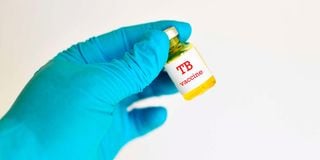Sh29trn global plan to eliminate TB by 2030

TB vaccine
What you need to know:
- TB is the second leading infectious disease killer in the world.
- The Global Plan to End TB 2023-2030 (‘Global Plan’) outlines the priority actions and estimated financial resources needed to end TB as a global health threat by 2030.
Stop TB Partnership has unveiled a costed implementation plan for the world to eliminate tuberculosis (TB), which would involve the diagnosis and treatment of 50 million people at a cost of $250 billion (Sh29.5 trillion).
TB is the second leading infectious disease killer in the world.
The Global Plan to End TB 2023-2030 (‘Global Plan’) outlines the priority actions and estimated financial resources needed to end TB as a global health threat by 2030.
It also lays out how, from now up to 2030, the global investment of Sh29.5 trillion could save millions of lives through early diagnosis and treatment; the development, approval and distribution of a new TB vaccine; and the redoubling of efforts so that emerging crises like the Covid-19 pandemic or conflicts like the ongoing war in Ukraine, do not derail TB programmes.
The total amount of funding needed to support the Global Plan’s ambitions is the equivalent of every person in the world donating US$4 per year (Sh472) for the next seven years. The economic return on this investment would amount to US$40 (Sh4,700) for every US$1(Sh115) invested—and as much as US$59 (Sh6,900) for every US$1(Sh115) invested in low- and lower middle-income countries.
But if the status quo is maintained, TB is expected to continue to kill between 4,000-5,000 people every day, an additional 43 million people will develop the disease and the cost in human life and disability would translate to a global economic loss of US$ 1 trillion.
“The Covid-19 pandemic delivered a crystal-clear wake-up call — that we cannot ignore a disease just because it has been relegated only to the poorest parts of the world. With our attention diverted—along with the absence of financial commitments—TB has strengthened its grip on our planet. But we can regain control and meet our commitments to end TB by 2030 as long as we assert our political will now,” said Dr Paula Fujiwara, who led the taskforce in charge of the development of the Global Plan.
The Global Plan maps out how to end TB as a public health challenge by 2030—the year by which governments around the world committed to achieving the United Nations Sustainable Development Goals (SDGs). SDG three is to “ensure healthy lives and promote well-being for all and all ages,” and one of the targets includes ending the TB epidemic.
“TB afflicts 10 million people every year, claiming 1.5 million lives, and yet compared to Covid-19 — whose response was to plough money and resources into developing diagnosis tools, treatments and vaccines at lightning speed — the global reaction has been tepid at best. A similar airborne infectious disease, TB remains neglected even though it is a health threat for every single person. It is in the interest of all of us to end TB,” said Dr Lucica Ditiu, executive director of the Stop TB Partnership.
The Global Plan highlights the need to invest in a new TB vaccine, approve it by 2025 and make sure resources are available so that it can reach adults and adolescents in countries where the disease is most prevalent. The only TB vaccine currently available is the BCG, which was approved more than a century ago and has a limited impact on disease prevention.
“The proposed investment of US$ 10 billion (Sh1.1 trillion) in new TB vaccines, a new tool we all are waiting for, is 10 times less than what was injected in the research and development for Covid-19 vaccines. It should be possible to have the TB vaccine, isn’t it?” Posed Dr Ditiu.




